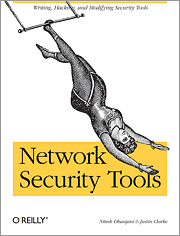
|
FreeComputerBooks.com
Links to Free Computer, Mathematics, Technical Books all over the World
|
|
- Title: Network Security Tools: Writing, Hacking, and Modifying Security Tools
- Author(s) Justin Clarke, Nitesh Dhanjani
- Publisher: O'Reilly Media; 1 edition (April 11, 2005)
- Paperback: 344 pages
- eBook: HTML and PDF
- Language: English
- ISBN-10: 0596007949
- ISBN-13: 978-0596007942
- Share This:

|
If you're an advanced security professional, then you know that the battle to protect online privacy continues to rage on. Security chat rooms, especially, are resounding with calls for vendors to take more responsibility to release products that are more secure. In fact, with all the information and code that is passed on a daily basis, it's a fight that may never end. Fortunately, there are a number of open source security tools that give you a leg up in the battle.
Often a security tool does exactly what you want, right out of the box. More frequently, you need to customize the tool to fit the needs of your network structure. Network Security Tools shows experienced administrators how to modify, customize, and extend popular open source security tools such as Nikto, Ettercap, and Nessus.
This concise, high-end guide discusses the common customizations and extensions for these tools, then shows you how to write even more specialized attack and penetration reviews that are suited to your unique network environment. It also explains how tools like port scanners, packet injectors, network sniffers, and web assessment tools function.
About the Authors- Nitesh Dhanjani is a well known security researcher, author, and speaker. Dhanjani is currently Senior Manager at a large consulting firm where he advises some of the largest corporations around the world on how to establish enterprise wide information security programs and solutions. Dhanjani is also responsible for evangelizing brand new technology service lines around emerging technologies and trends such as cloud computing and virtualization.
- Justin Clarke is a Director with Gotham Digital Science, based in the United Kingdom. He has many years of experience in testing the security of networks, web applications, and wireless networks for large financial, retail, and technology clients in the United States, the United Kingdom and New Zealand.
- Networks Administration and Management
- Computer and Information Security
- Computer Networks and Communications
- Books by O'Reilly®

- Network Security Tools: Writing, Hacking, and Modifying Security Tools (Justin Clarke, et al.)
- The Mirror Site (1) - PDF
- The Mirror Site (2) - PDF
-
 Open Source Security Tools: A Practical Guide to Security Apps
Open Source Security Tools: A Practical Guide to Security Apps
This book is a practical, hands-on introduction to open source security tools. It reviewed the overwhelming assortment of these free and low-cost solutions to provide you with the "best of breed" for all major areas of information security.
-
 Security Engineering: Building Dependable Distributed Systems
Security Engineering: Building Dependable Distributed Systems
It makes it clear just how difficult it is to protect information systems from corruption, eavesdropping, unauthorized use, and general malice, offers a lot of thoughts on how information can be made more secure by both technologies and strategies.
-
 Security Concepts (Subspacefield)
Security Concepts (Subspacefield)
This is a book about computer, network, technical, physical, information and cryptographic security, illustrated with interesting and entertaining examples. It is not intended to be an introductory text, although a beginner could gain something from it.
-
 Rational Cybersecurity for Business (Daniel Blum)
Rational Cybersecurity for Business (Daniel Blum)
This open access book presents six priority areas to focus on to maximize the effectiveness of your cybersecurity program: risk management, control baseline, security culture, IT rationalization, access control, and cyber-resilience.
-
 Security of Ubiquitous Computing Systems (Gildas Avoine, et al)
Security of Ubiquitous Computing Systems (Gildas Avoine, et al)
It is to improve and adapt existent cryptanalysis methodologies and tools to the ubiquitous computing framework that lies along four axes: cryptographic models, cryptanalysis of building blocks, security engineering, and security assessment.
-
 Computer Security Handbook (Seymour Bosworth, et al.)
Computer Security Handbook (Seymour Bosworth, et al.)
This handbook has compiled advice about how to minimize the possibility of computer security breaches in your systems. It provides comprehensive best guidance about how to minimize hacking, fraud, human error, the effects of natural disasters, and more.
-
 Handbook of Information Security Management (Micki Krause)
Handbook of Information Security Management (Micki Krause)
Bringing together the knowledge, skills, techniques, and tools required of IT security professionals, it facilitates the up-to-date understanding required to stay one step ahead of evolving threats, standards, and regulations.
-
 Security+ Essentials (Neil Smyth)
Security+ Essentials (Neil Smyth)
This book is designed to provide the knowledge needed by IT professionals to pass the CompTIA Security+ examination. It is also of considerable use to anyone with a need to understand the concepts involved in creating and maintaining a secure IT environment.
-
 Beautiful Security: Leading Security Experts Explain How They Think
Beautiful Security: Leading Security Experts Explain How They Think
This book features a collection of essays and insightful analyses by leaders who have found unusual solutions for writing secure code, designing secure applications, addressing modern challenges such as wireless security, and much more.





